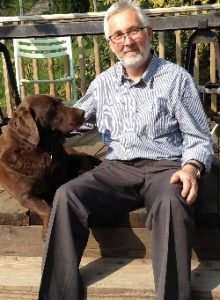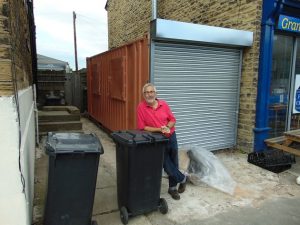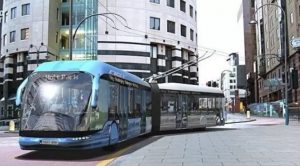Former Pudsey councillor – and Leeds’ transport chief – Richard Lewis lost his seat at last week’s Leeds local elections after serving the town for 33 years. In the first of a two-part interview, he speaks to Richard Beecham about his time on the council and some big transport decisions ahead for the city…
“Come and meet me at my house if you like,” came the chirpy response. “Tomorrow morning is fine.”
I have to say, I was expecting one of Leeds City Council’s most high-profile councillors to need a little more cajoling to do an interview, less than a week on from losing his Pudsey seat at the local elections.
But when I arrived at the Pudsey cottage where the – now Mr – Lewis resides, I find him in a remarkably relaxed and chipper mood, much like a weight had been lifted from his shoulders.
Richard Lewis was at the nerve centre of Labour’s operation in Leeds for nearly 30 years – first as head of the council’s planning committee in the 1990s, before spending the last decade as the portfolio for transport and planning.
We took a short walk around the garden, in which pet pig, Betsy, as well as numerous chickens are kept by his partner Liz. He tells me they were lucky to get hold of the property, as a business which failed to gain planning permission to convert the house had been looking to sell the property on the cheap.
We are then followed back to the house by his inquisitive Labrador Walter before we chatted over coffee in his sitting room.

So how did a 30-year career in local politics start? Hailing from Sussex, he admitted that campaigning for Labour in such a Tory stronghold during his younger years was often a thankless task.
“It is always something I have been interested in – there must be something wrong with me,” he said.
“I remember in the 1970 election, our parliamentary candidate’s wife had a dream, and he had interpreted this as meaning he would be in the House of Commons – but we got absolutely trounced.
“I suppose Leeds was a lot easier than Sussex, but very different in other ways in terms of poverty and deprivation.”
As we looked out over Tyersal Beck, the relaxed and idyllic settings were a far cry from the Leeds he first experienced when making the move north in 1977.
“It was a very different city from today,” he added. “Very much a grimy, industrial city – not filthy – but it was still an industrial city.
“I worked on the buses back then, and I can remember taking buses full of blokes at five o’ clock in the morning, all smoking, from Middleton down to the factories in Hunslet, and all that has just gone.
“Why? The city’s functions have changed. It used to be to make things, but the 1980s changed that.
“I suppose what I saw was the fag-end of big industry.”

He was elected as a councillor for Pudsey in 1986, following an unsuccessful run two years earlier.
“I had managed to hang on ever since,” he added. “Pudsey is not a straightforward place. I was there for 33 years – that’s a third of a century!”
It wasn’t long before his elevation to chairman of the council’s housing committee in 1992.
“I was very lucky,” he mused. “There is always a generational thing in council. Mine was people like Coun Jim McKenna (Armley), myself and Keith Wakefield – the people just in front of us, like John Battle and Bill Kilgallon, went off to do other things, and there were openings for us relatively early in our political careers.
“It was a big committee in council terms – it’s quite frightening to think that now. At that time we had a huge number of council houses and it was one of the big functions of the council.
“It was a very hard time – the Tories were so ideologically anti-council housing. You had a negative subsidy whereby council rents in Leeds went into a central pot and a lot was redistributed to London boroughs, which didn’t seem fair to me.
“When it came to disrepair of council properties, you just didn’t have the money to do the things you really needed to, and central government wasn’t interested in the least.”
Following Labour’s six-year period out of power during the 2000s, he was elevated to portfolio-holder for transport and planning in 2010.

Arguably the biggest transport issue during that period was the continuing will-they-or-won’t they saga over the proposed £170m trolleybus public transport system, which was eventually scrapped in 2016.
A planning inspector’s report at the time, which followed a 72-day public inquiry, said Leeds City Council had failed to show the benefits of trolleybus were worth the damage that would be caused by construction along the route. Mr Lewis said:
“When we took over in 2010, [the previous administration] had already got to the point of taking on a bus-based alternative to super-tram [another shelved integrated transport plan from the 1990s].
“We always saw it as a good scheme rather than a brilliant scheme, and there was always so much pressure to get something in Leeds, because we were seen as this city that didn’t have a mass transit system.
“Hindsight changes people’s perceptions of how things were. There have been no new mass transit schemes approved since 1997 – because of the delays that had happened early, it was almost like the world was against us.
“We always felt deeply frustrated by this. It was always having to go down to London with the begging bowl. There were endless meetings with ministers saying ‘I don’t like this’ or ‘I don’t like that’.
“This has coloured our view of devolution and the need for these decisions to be made locally.
“Headingley Lane was always very difficult – decade after decade it has always met public outcry. Headingley was always going to be a difficult place to do anything.”
So what about the future? It was only last year when former Leeds City Council leader Keith Wakefield had suggested space-age transport solutions such as Hyperloop could eventually come to the region.
“The technology will be incredibly exciting,” said Mr Lewis. “But I don’t think we will get there as quickly as people think.
“Mass transit will not of itself solve congestion problems unless we do it right. We also have the climate change debate coming up in a big way at the moment – cities simply cannot function under the private car.
“There is a decision to be made about what we want to be in the future.”
But transport and planning extends beyond roads and trains.
The Leeds South Bank project is one of the world’s largest ongoing urban regeneration projects. The council hopes its master-plan will help new developments double the size of the city centre, creating 35,000 jobs and 8,000 new homes in that area over the next 15 years.
“A big part of my life was delivering what we have developed here,” he said. “So for future building and eco-housing, we can really see the movement.
“About 20 years ago there were only about eight people living in the city centre – it’s now as it should be. It’s sustainable and you can live in a different way.
“The south bank is going to change quite quickly – the challenge is to get the right mix and how to integrate these developments with the existing communities in South Leeds.”
The park and ride network brought in recently has transformed the way thousands of Leeds city centre workers get to and from their place of work, while alleviating potential traffic in and around the city centre.
As well as current schemes in Elland Road and Temple Green, the council is busy creating another park and ride scheme in Stourton. He said:
“In the past, it was often said that Leeds people would not get out of their cars and go with something else – we have disproved that with park and ride.”
Many in his position may feel that now might be a good time for to take a step back and put their feet up.
But does he have plans on a return to the council?
“I’m 65,” comes his brisk response. “This is the first chance I have had to take a proper rest!
“I have a big garden to look after and I am just enjoying taking a step back.
“Politics these days is relentless – when I first came on the council, I was lucky to get five phone calls or letters a week.
“Now people want a response immediately – it’s hard going.”
Watch out for part 2 of this interview, coming tomorrow.
___________
While you’re here…
Producing your daily dose of West Leeds Dispatch comes at a cost!
There’s the hosting of the website you’re reading now, running our popular e-mail newsletter, membership of independent press regulator Impress, attending summer events, paying for equipment etc etc.
We need at least £200 a month just to break even – that’s money currently coming out of the pockets of dedicated volunteers who are passionate about what’s happening in our communities, connecting you with local groups and organisations as well as holding decision-makers to account and championing local issues.
And all that’s BEFORE we even think about paying something for people’s time – for instance, our editor puts in more than 24 hours a week in his ‘spare’ time to ensure The Dispatch publishes daily.
To put it bluntly, after nearly four years of daily publishing, we are not sustainable!
And we need YOUR help to continue …
For the cost of less than a couple of cups of coffee you can help support local community news and continue to give our communities a voice by taking out a subscription for just £4 per month (that’s just a pound a week).
As a thanks you’ll get your name on a roll of honour on our website. More importantly you will be enabling us to keep bringing you the news that matters about your neighbourhood.
Achieving a bedrock of supporters will give us a firm financial footing and help us plan for the future.
Supporting us couldn’t be easier…
Just follow this link.
or set up a standing order with your bank:
Contact us on Paywestleedsdispatch@gmail.com if you’d like to do this.
Over to you …





Good to see that Richard recognises the need for devolution. That, allied to a fairer voting system would have ensured that Yorkshire, and in particular places like Pudsey would have had a much fairer share of the cake than in the past or the present. You only have to look at other places with similar populations to Yorkshire and similar diverse economies, where they have devolution, proper subsidiarity and more bottom up decision making things seem far more equal. And, after all, Equality is one of the cornerstones of social democracy, something centralised, institutionalised political decision making fails to deliver over and over again.
Yes Richard, devolution is part of the solution but things like the ridiculously named, Northern Powerhouse prove that when it is driven from the centre (ie Westminster) it is nothing more than a sop.
You deserve a good rest after 33 years on the job but I sincerely hope you use some of that time to consider how you can best use that experience to achieve some of those things I really do think you believe in but which you have not been able to achieve because of the way our poor political system, propped up by a reluctance to embrace much needed change works.
Good luck mate!